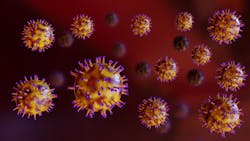The virus that causes COVID-19, which scientists refer to as SARS-CoV-2, likely does not integrate its genetic material into the genes of humans, according to a study published in the Journal of Virology.
A separate study recently reported that the virus's genetic material was found to have integrated into human DNA in cells in petri dishes. But the scientists conducting the newer research now say that result was most likely caused by genetic artifacts in the testing.
Majid Kazemian, Assistant Professor of Biochemistry and Computer Science at Purdue University, and one of the three co-lead authors on the research study, said that this finding has two important implications.
"Relatively little is known about why some individuals persistently test positive for the virus even long after clearing the infection. This is important because it’s not clear whether such individuals have been re-infected or whether they continue to be infectious to others. So-called 'human genome invasion' by SARS-CoV-2 has been suggested as an explanation for this observation, but our data do not support this case.
"If the virus was able to integrate its genetic material into the human genome, that could have meant that any other mRNA could do the same. But because we have shown that this is not supported by current data, this should allay any concerns about the safety of mRNA vaccines,” he said.
It is possible for the genetic material of some viruses to be incorporated into the DNA of humans and other animals, resulting in what scientists call "chimeric events." Human DNA contains approximately 100,000 pieces of DNA from viruses that our species have accumulated over millions of years of evolution. In total, this lost-and-found DNA from viruses makes up a bit less than 10% of the genetic material in our cells.
To examine the proposed integration event, the researchers developed a novel technique in which they extracted the genetic material from infected cells and then amplified or reproduced the genetic material 30-fold. If there were chimeric events in the host cell DNA, these bits of genetic material from SARS-CoV-2 should also increase 30 times. The data did not show this.

